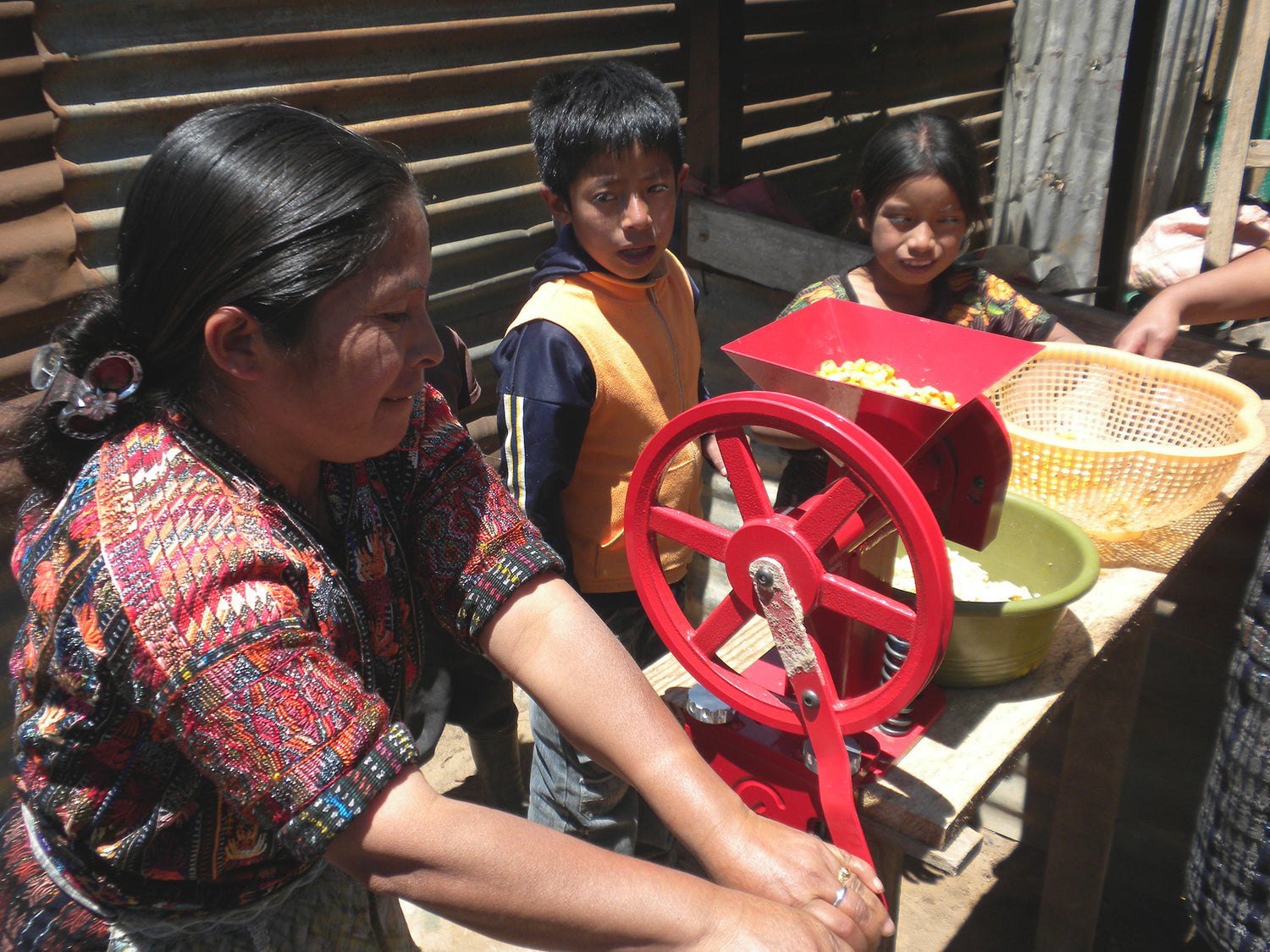Project Molinillo - Creation of a Community Corn Grinder
Moving forward with the Red Oxx Fair Trade adventure in Guatemala, CEO Jim Markel checks up on his Molinillo project: the building of a corn mill for the villagers who make the Monkey Fist Zip Knots. If you missed Jim’s previous trips to Guatemala, you can get caught up at Oxx Tales. Let's find out what he’s up to now?
My report last year was full of optimism and excitement about the new property acquisition for the Molinillo. With the Monkey Fist Zip Knot production running like clockwork I thought this Molinillo project would be a piece of cake. The new corn mill would save our workers from walking 2 1/2 hours each way to the nearest mill to grind their corn for tortillas. This is a staple of the Guatemalan diet and no meal would be complete without it.

Another important aspect of this effort is the community that’s created around it. The mill is more of a service and social gathering place than a huge money maker. Yet it still has to provide a daily source of cash flow and employment in the village. This has all been part of our own effort to build a Fair Trade policy without the middlemen getting in the way. While NGOs serve a purpose, I believe in doing it yourself to make sure the money goes where it’s needed most. I bid them adieu and fully expected to find a running operation on my return the following year.

Logo Atitilan Volcano
Our fledgling entrepreneurs had made the classic error of jumping the gun. In an effort to get the ball rolling they had opened a Tienda in the old building which had been slated for demolition. A Tienda is like a small convenience store, of sorts. They're the snack shacks of Central American neighborhoods and can be found in the multitudes about the larger towns and cities. Specializing in a rather diverse assortment of delicious but rather unhealthy snacks make them a must visit if you need a quick treat. While there are some in the smaller villages, they tend to whither without an attraction.
Our Molinillo was envisioned to be complemented by a Tienda...eventually. Somewhere in the translation they had figured on getting this part of the operation open first. Well as Tienda’s go this one was a pretty sad little affair, and without the draw of the Molinillo this one was going nowhere.
The idea behind our micro loan was to encourage entrepreneurship. So I took the news with an open mind and set about rectifying the situation. Over the next several hours I took them through the steps of operating and accounting for this venture. I could see I was pushing them a bit hard and Lisa my interpreter and in-country agent said it was time to take a break.
While events over the last year hadn’t gone according to plan it was a good learning experience for all. Shifting paradigms from one culture to the next can be challenging. If you can manage to embrace the opportunity to experience a foreign culture with its subtle nuances you will find the exchange of perspectives is more valuable than trade itself.

Chicken Bus
Walking the building site I began to wonder what the deep holes were for and the answer gave me even more cause for concern. Since our building site is located on a mountainside we would have to deal with some serious grade in the terrain. The contractor, or what passes for a contractor in Guatemala, had suggested a building on stilts. While no structural engineer I could clearly see this was a recipe for disaster given the proclivity for earth quakes. This would not do. Time to get out the scratch pad and a brand new plan.
A quick look across the valley provided a fine example of how to do things right. By digging into the hill side we would be taking advantage of the natural cooling properties of the earth. This would also allow us to build a solid structure that could be added onto vertically in the future.
CHILDREN OF THE CORN
The connection between the Guatemalan people and corn precedes recorded history. The word Maya literally means "the people of corn" an apt description for the rural population which still lives close to the land. With an integrated strategy of industrial production and continued cultivation of the land they just might be living the future/past model of life on earth. While recent books have sounded the call for this practice in the U.S. it’s something that’s part of the landscape in developing countries.

Our happy Monkey Fist tying villagers
The markets abound with locally grown produce and the surplus is shipped around the world. At some point in the last 100 years we stepped past this model and began shipping products into supermarkets from every conceivable corner of the globe. While it’s quite enjoyable to have a handful of grapes come December in Montana I question the sense in shipping my eggs in from another state.
When summer’s in full swing I look forward to Saturday mornings here and buying my locally grown produce at the farmers market. What began as a small collection of locally grown produce and meat has blossomed into a thriving business platform for the local farmers. A much needed cash injection right where it is needed most. This circle of commerce is something that really connects you with the producers and changes the whole market experience as it relates to food. Our micro loan is just a tiny contribution in creating jobs in Guatemala but it means the world to our dedicated team there.
MONKEY FEVER
It’s been quite some time since we started putting these unique zipper pulls on our gear bags and cases. While the volume has been gaining over the years with our internal consumption it’s been the individual sales of knots that has been the big surprise. Infesting the world with monkey knot fever has been the best aspect of our efforts to make life a little better here in Guatemala.
Our workers enjoy an above average income level and leave no trace environmentally of what they produce. Our cord is made in America and makes a round trip journey back to our Montana plant. Standing on a hillside above the village I find it hard to put into words what this has meant for our people here. Seems like a lot of work for a mere zipper pull but I know it’s been worth the effort.
Not only have we improved the lives of these proud people, we’ve fostered entrepreneurship and hope. This has all been possible with the continued patronage of you, our awesome customers. We have estimated that we will have Project Molino paid off after 60,000 units. Once again I challenge you to find more unique uses for this handy little zipper pull and to get the knot chain moving by infesting the world with monkey fist fever!
Cheers,
Jim Markel, CEO Red Oxx
Did you enjoy Jim's latest installment of his on-going Guatemala Trip Reports? Be sure to read the next adventure, A Fair Trade Marathon in the Making.




Leave a comment
This site is protected by hCaptcha and the hCaptcha Privacy Policy and Terms of Service apply.